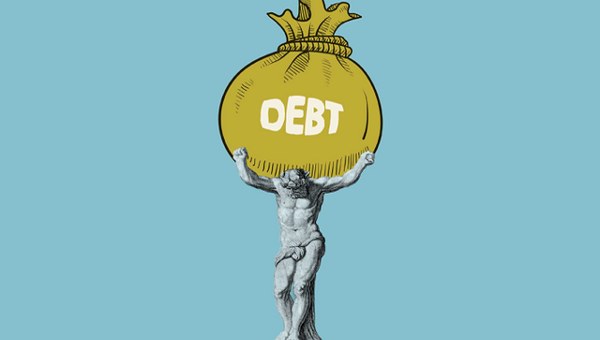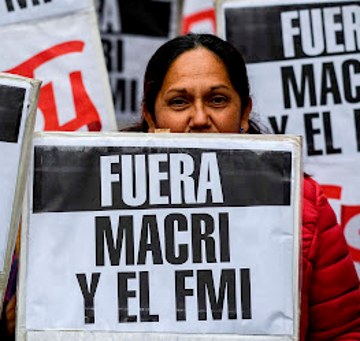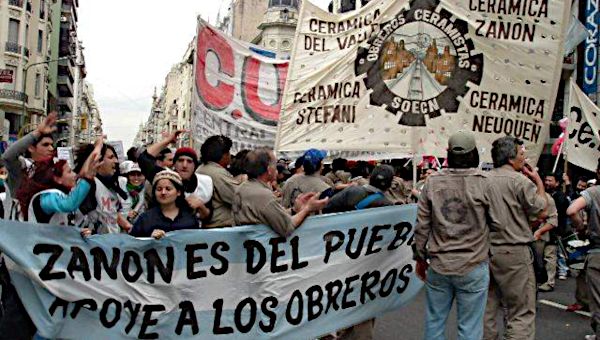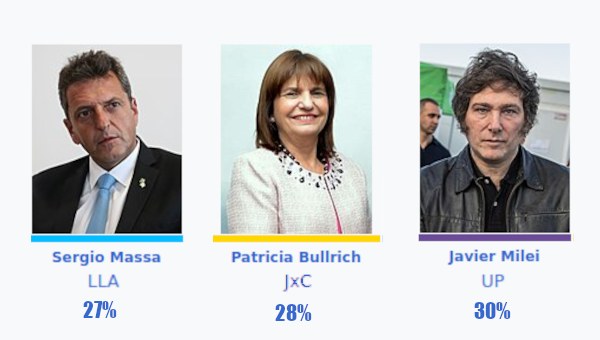A Country Is Entitled to Refuse to Repay a Debt
The following interview, given by Éric Toussaint to the Argentine review Mugica, has been adapted to make it accessible to readers who are not necessarily aware of the details of what is going on in Argentina.
The arguments used in the article are supported by the realities of the situation in Argentina. They can be applied to many countries around the world as they are based on a series of concrete experiences, jurisprudence and concepts linked to international law.

Mugica Review (MR): In 1927 Alexander Sack claimed that for a debt to be defined as odious, the nature of the political regime is irrelevant. In other words, it is irrelevant whether it is a dictatorship or a democracy, since the decisive factor is whether that debt was contracted against the interests of the people. Do you agree with that claim? Isn’t the concept of “respecting the interests of the people” rather ambiguous?
Éric Toussaint (ÉT): The doctrine elaborated in the 20th century by Alexander Sack on the basis of two centuries of jurisprudence from litigation over sovereign debt makes it perfectly clear that the nature of the government is not a criterion for determining the odious character of a debt. Regarding the question of “against the People,” there are three terms in the doctrine that make reference to this contradiction, namely debt contracted against the interests of the Nation, contracted against the People and/or against the interests of the State.
If we really want to put democracy into practice, it is up to the citizens, making use of domestic law and international jurisprudence, to say what is against the interests of the People, the Nation or the State. That is therefore a necessary part of democratic debate. In my view, in all circumstances there should be a debt audit to identify which parts of the debt demanded of a country are odious, illegitimate, illegal and/or unsustainable. In some cases a country’s entire debt may be considered odious, illegitimate, illegal and/or unsustainable.
If we apply the doctrine to the specific case of Argentina, I would say that in 2018 President Mauricio Macri contracted an enormous debt with the IMF against the interests of the State, the Nation and the Argentine people. The government of Mauricio Macri, who was democratically elected in 2016 and was not a dictatorship, received $44-billion from the IMF to try to get him re-elected in 2019. The IMF under pressure from Donald Trump’s Administration, made this loan to Argentina with a view to keeping this ally of Washington in power. What actually happened was that the $44-billion paid out by the IMF (the biggest loan the IMF has ever made to any country) aggravated the country’s situation, the ongoing crisis worsened and the vast majority of the money loaned went straight back out of the country. The Argentine people rejected this policy and in 2019, they voted for the change proposed by Alberto Fernandez, who denounced Mauricio Macri’s policy of indebtedness and promised to turn it on its head.
MR: Both Sack and yourself, in the name of the Committee for the Abolition of Illegitimate Debt (CADTM), focus on the collusion of creditors in determining whether a debt is odious. What tools could be used to establish objective criteria in proving creditors’ complicity?
ÉT: An audit carried out by the country’s citizens is required, but obviously complicity means that the lenders are well aware of what the money allocated is being used for, whether they are a multilateral institution like the IMF, bondholders or countries and banks granting loans to the country. In the case of the IMF, there is no doubt that they impose their conditions in full knowledge of the use that is going to be made of the money. Not only do they know, but they play an active role in how the money is used, by agreeing on it with the government asking for the loan. A Letter of Intent is negotiated between the IMF and the government (whether it is Macri’s or others, even with dictatorships) giving the IMF guarantees.
As far as other lenders are concerned, I would say that a bank or investment fund should be under obligation to analyse the solvency of the individual or country asking for money. That is common practice after all: even when a bank lends money to a household or a business, it has an obligation to investigate their solvency and discuss the conditions of repayment.
In the case of sovereign Argentine bonds, the Argentine government produced a prospectus explaining the economic situation in which it gave details of the conditions under which the debt had been contracted. The investment fund should be under obligation to examine the truth of these claims. Those who bought the centenary bonds issued by Macri’s government obviously did not carry out a serious analysis before lending money to Argentina for a hundred years, taking the state of the country’s economy into account; they did it because the annual yield was almost 8% when US Treasury Bonds were yielding no more than 2% a year at best. US banks are thus out to garner higher profits, but are well aware that if a country offers almost 8%, this means that there is a risk of defaulting. By contrast, countries such as Germany, France or the USA borrow money at an often negative rate, and in the best of cases, with yields under 2%. So the lenders must bear the risk they have taken by buying the bonds, and should it transpire that the government’s explanation of the situation was misleading, then there would be wrong-doing, but the bond-holders would be the wrong-doers for having accepted it. It is crucial for a State to make sure that the investor’s liability in buying securities comes before its own liability.
MR: Let us leave creditors’ liability aside for a moment, to discuss the responsibilities of local governments. Could they be brought to trial? Is there any international body that could intervene?
ÉT: The doctrine of odious debt stipulates that when a regime changes, the new regime can refuse to honour debt contracted by the previous one, based on the argument that it did not sign the contract and that creditors bought securities to help the outgoing government knowing full well the risks they were taking.

The new regime can also question the use that this money had been put to, if it can be shown that the previous government accumulated debt in order to remain in power. This is what Mauricio Macri did, in a desperate attempt to win the elections. (Although the ploy didn’t work, it certainly worsened the crisis.) In 2016, under the Macri government, the debt had begun to increase then in 2017, a hundred-year bond was issued, which was pure folly. 2018 saw a headlong rush forward, with an IMF loan just before the elections. The whole episode can be seen as a case of a president accumulating debt in his own interests, to win the elections, without a moment’s consideration of the interests of the Nation.
As for a legal body competent to handle these matters, there is no International Debt Court. The question has been under debate for over a century and closely concerns Argentina. In the late 19th/early 20th century two important political figures and jurists, one Argentine and the other Uruguayan, Luis María Drago and Carlos Calvo, vehemently took up this cause, also contesting the use of force by creditor powers like Great Britain, the United States, France Germany and Italy. Their action led to negotiations in The Hague, in the Netherlands. It was the first international conference of The Hague on the question of whether or not to use force to settle problems arising from debt. During the negotiations between Drago, representing Argentina, and Porter, representing the United States, in 1906 – 1907, a constitution for an International Settlement Court to arbitrate disputes over sovereign debt was discussed but nothing came of it. During the crisis of the 1930s, once again there was talk of creating an international body, which again came to nothing.
Then after the Argentine crisis of 2001, the First Deputy Managing Director of the IMF, Anne O. Krueger, also spoke of a mechanism for multilateral negotiation but yet again, no decision was reached. There is therefore no international court of law competent to adjudicate on a country’s debt toward a multilateral organism or private creditors. That is why the solution for a country is to exercise its sovereignty, in other words, for its government to rely upon jurisprudence, international law, domestic law, its own Constitution, and to make a justified sovereign decision.
MR: In contexts where debt is “financialized” and where there is automatic renewal, spread over multiple creditors whose identity is no longer known, how can you determine which part of the debt is odious and which creditors are complicit?
ÉT: An investment fund that buys up debt on the secondary market must also analyse the country’s economic situation. A securities buyer on the secondary market cannot simply say “I know nothing about this country’s situation. I bought a bond and they must repay me.” We know they do analyse the situation, and that is how the term “vulture funds” came into use. They are funds which buy up securities with the express intention of taking the country to court, knowing full well that it is in a dire economic situation, which is why the securities are being sold at 10 or 20% of their true nominal value. The vulture funds’ strategy is to wait for an improvement in the situation, as happened in Argentina after 2005, to take the country to court. A possible solution would be for a legitimate government, at a given point in time, to demand a register of creditors, and to negotiate only with bond-holders who declare themselves to the authorities. They must be registered with the Argentine Consulate in the United States, Italy or whatever the bond-holder’s country might be, which would enable international control.

Jurisprudence exists on this subject, as in the case of Mexico against its creditors, mainly North-Americans, in the 1920s and ’30s. Mexico made an agreement with a cartel of creditors presided by the JPMorgan Bank and on that occasion, it was stipulated that all bond-holders should register and present their securities,1 so that the Consulate could stamp them and the bond could no longer change hands on the strength of belonging to “the holder” without the buyer’s name appearing anywhere.
MR: In 2015, following a decision of the Hellenic Parliament, you coordinated the Truth Committee on Greek Public Debt. What was the result of that report and how was it used by the government?
ÉT: The honest truth is that the Greek government simply ignored the audit committee and the Speaker’s decision. Officially and in front of the Greek people the government supported it. The Prime Minister came to the inaugural session of the audit committee’s work on 4 April 2015 and also attended the presentation of its conclusions on 17 June 2015 but he was not on the same wavelength regarding negotiation; indeed this turned out to be a disaster for Greece. In my view, the case of Greece is a typical example of a government without the courage to confront its creditors; and the outcome of that lack of courage is that in Greece today, the ratio of public debt to GDP is almost 200%. The situation is absolutely catastrophic: there has been no reduction of debt between 2015 and 2020. It is a disaster for Greece. The population is disillusioned and demoralized. Positive examples are Ecuador in 2007/2008 or Iceland in 2008; Greece in 2015 is a very sad example.
MR: On the basis of what has been explained above, you maintain that Argentina’s debt can be considered as ‘odious’. Do you think we are empowered to refuse to pay it back?
ÉT: Yes, I am certain that it is possible, but a country will only have the strength to go through with it if it relies on a very strong decision, based on arguments from international law and domestic law. That’s why it is so important for the government to inform the citizens and associate them with the analysis of debts claimed. That way they will have the legitimacy to make the decision to repudiate the debt or suspend payments and be able to count on popular support. For a decision to be implemented, there has of course to be a confrontation with the creditors, but the relationship between financial interests and public authorities is never going to be a story of calm and friendly negotiations. It is a matter of the balance of power and confrontation. And to be frank, the moral support of Pope Francis and friendly declarations from other governments will never be enough. If the government of an indebted country is convinced that it has the right to refuse to pay, it must be extremely decisive in constructing a balance of power with the creditors.
MR: Considering the pandemic and the legal instruments that empower a State to decide to cease payments because of “a state of necessity,” “a change of circumstances” or “in a case of force majeure,” do you think Argentina has missed an opportunity to refuse to pay its debt?
ÉT: Yes, an opportunity was missed at the end of 2019- beginning of 2020 in the first months of Alberto Fernandez’s presidency but the initiative can still be taken back: an argument could be that the country had hoped for a little understanding but that now it is facing a second wave of the pandemic throughout the Americas. In such circumstances the government must take urgent measures, buy equipment to deal with the situation and prioritize the population’s health. In this case the decision to cease debt payments is independent of whether or not it is odious. The operative problem would be “a state of necessity,” “force majeure” or “a fundamental change of circumstances.”
MR: We often hear that beyond the legality of the issue, in practice, refusing to pay a debt, even an odious one, would come at an enormous cost for a country in terms of credit access for public and private sectors.
ÉT: Evidence to the contrary can be found in several studies of this question, particularly by former senior officials of the Inter-American Development Bank like Ugo Panizza, who is now a university professor in Geneva. He published a study in 2011 which concluded that suspension of debt payment is the first step in economic recovery. He bases this claim on the cases of Argentina in 2001/2005 and of Russia in 1998/2003, amongst other examples.
In an article published by the Journal of Development Economics entitled “The elusive costs of sovereign defaults,” Eduardo Levy Yeyati and Ugo Panizza present the results of their detailed research into defaults of payment for about forty countries. One of their conclusions was as follows: “The periods of suspension of payment mark the beginning of economic recovery.” It couldn’t be clearer.
In a collective work published in 2010 by OUP,2 Joseph Stiglitz claims that Russia in 1998 and Argentina in the 2000s were the proof that unilateral suspension of debt repayment can be beneficial to countries that make this decision: “Both theory and evidence suggest that the threat of a cut-off of credit has probably been exaggerated.” (p. 48)
Under this scenario the number of the firms that are forced into bankruptcy is lowered, both be-cause of the lower interest rates and because of the improved overall economic performance of the economy that follows. As the economy strengthens, government tax revenues are increased – again improving the fiscal position of the government. […] All this means that the government’s fiscal position is stronger going forward, making it more (not less) likely that creditors will be willing to again provide finance.” (p.48) He adds: “Empirically, there is little evidence in support of the position that a default leads to an extended period of exclusion from the market. Russia re-turned to the market within two years of its default which was admittedly a ‘messy one’ involving no prior consultation with creditors […] Thus, in practice, the threat of credit being cut off appears not to be effective.” (p. 49)
Several analyses show that there is competition between lenders. So if a country imposes a very large financial burden on its creditors, when the economic situation improves other potential lenders appear on the scene. Indeed their decision to grant a loan is based on the very fact that the country’s situation has improved, its debt has been reduced and economic growth has increased. The idea that a country that suspends debt payments cannot return to the markets is thus ill-founded.
MR: What do you think will be the most likely scenario after the pandemic?
ÉT: The situation will be worse in the immediate future because States will have increased their public debt substantially. For Europe, that is obvious. In my country, Belgium, the ratio of public debt to GDP was a little less than 100 % in 2019 and could officially exceed 120 % in 2021; France is in the same position. Italy, however, will reach 150%. The situation in countries of the South like Argentina, Brazil and Southern Africa will worsen. To face the economic crisis, States are looking for fresh loans. The same is happening in the North. So my impression is that public debt crises will intensify over the next 5 or 10 years and that this will become a central issue on the international level. Countries like Brazil, South Africa and countries of the North (like several European countries) are going to find themselves in an unprecedented situation, very difficult to resolve, with questions of possible suspension of payments, rescheduling the debt and endless negotiations, amongst other things. •
This article first published on the CADTM website.
Endnotes
- The agreement that put an end to the conflict between the international Committee of Bankers and Mexico was an act of surrender on the part of the banks. While the Committee demanded payment of debts estimated at $510-million (US) (capital and interest), the final agreement mentioned payment of less than $50-million (US): a cut of over 90%. Moreover, what is most remarkable is the rate used for compensation of default interest: 1/1,000 for delays before 1923, 1/100 for 1923-1943. Now in many debt restructuring agreements in the 19th century or in the first half of the 20th century, all default interest was turned into owed capital. $500-million (US)! And 20 years had gone by. By agreeing to pay a debt of $50-million (US) (capital and default interest included), the Mexican government won a resounding victory. There is more: security holders had to hand in their securities and have them registered and stamped by the Mexican authorities before they could claim any compensation! Bankers had to register securities with the Mexican government: this was unprecedented. See: Wynne, William. 1951. State Insolvency and Foreign Bondholders. Selected Case Histories of Governmental Foreign Bond Defaults and Debt Readjustments, Vol. 2. New Haven: Yale University Press, 1951, p. 97. See also: Eric Toussaint, The Debt System A History of Sovereign Debts and their Repudiation, Haymarket Books, Chicago, 2019, P. 163
- Herman, Barry; Ocampo, José Antonio; Spiegel, Shari, 2010, Overcoming Developing Country Debt Crises, OUP Oxford, UK, ISBN: 9780191573699





